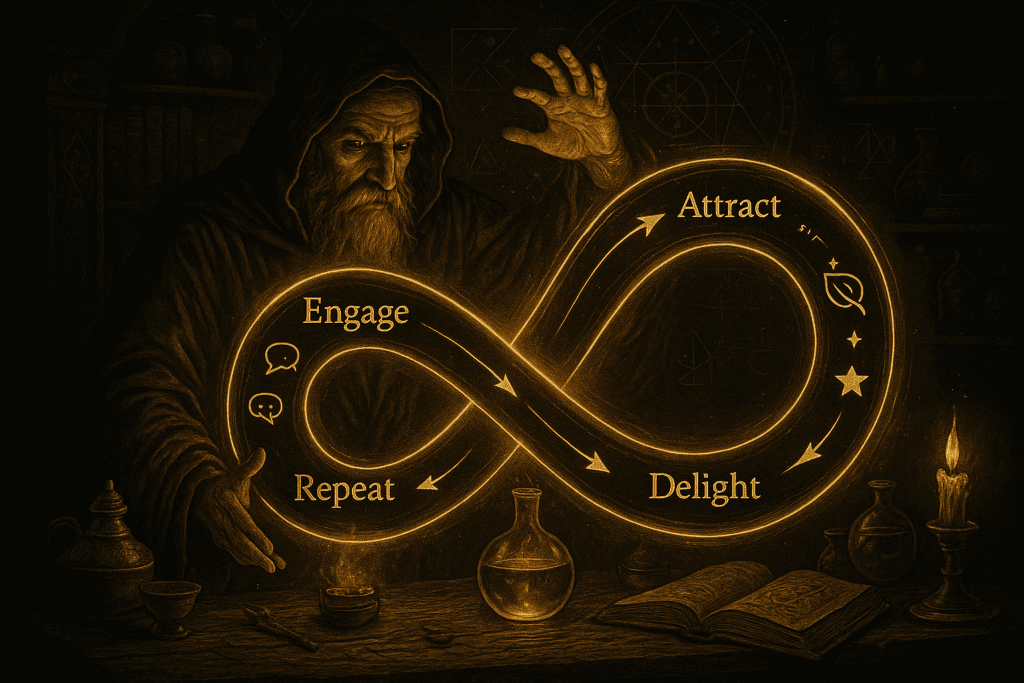
Why AI-Driven Personalization is the Future of Marketing
Marketing is constantly evolving, and understanding this is crucial. As we look back, we see how strategies have shifted from broad print ads to finely tuned digital campaigns focused on getting those clicks and conversions. Now, AI-driven personalization is taking the stage.
Imagine entering a store where every item is perfect for you. Online, AI aims to offer that experience by customizing every interaction based on your choices and habits. The idea of one-size-fits-all marketing is fading fast. Instead, personalized marketing is drawing in more consumers and boosting loyalty. Businesses savvy enough to harness AI are turning data into personalized journeys, engaging customers like never before.
But what does this mean for marketing’s future? As we explore AI’s potential, we discover how it can create consumer experiences tailored just for the individual. For founders and strategic leaders in rapidly growing businesses, AI isn’t just a trendy buzzword. It’s a critical tool for achieving significant growth.
Table of Contents
Blog Newsletter
The Evolution of Marketing: From Generic to Personal
Marketing has changed dramatically over time, moving from mass outreach methods like billboards and TV ads to the digital age, where personalization is key. In the past, every consumer received the same message. Today, digital technologies and data analytics have changed that, enabling brands to understand consumers better than ever.
Think of it as moving from broadcasting a message to delivering a private show. With omnichannel strategies, companies not only ensure consistency across platforms but also tailor their content to individual preferences. This shift isn’t just about adopting new tech; it’s about a new way of thinking, where consumer data powers the precision of the marketing message.
Personalization isn’t just a trend; it’s a powerful method that boosts engagement. Studies show how personalized marketing efforts significantly enhance engagement rates. Brands utilizing data analytics to customize user experiences see much higher click-through rates and conversions. Personalization is not an option anymore, it’s essential.
Searches for "personalized marketing" have doubled over the last 5 years.
“In fact, 80% of consumers are more likely to purchase if there’s personalization involved in the customer experience.”
How AI Personalization Drives Results
In a world where immediacy and seamless experiences are paramount, AI-driven personalization is a game-changer. This cutting-edge technology doesn’t just improve customer experiences; it significantly ramps up engagement and conversion rates. AI’s sophisticated algorithms analyze vast data sets in moments, finding patterns that are beyond human detection. This capability allows marketers to reach individuals, not just segments.
Consider how AI marketing automation optimizes the customer journey. By using AI’s precision in automated lead generation, businesses can nurture their leads with personalized messages that reach consumers through ideal channels at perfect times. This reshaping of the customer journey turns casual browsers into loyal brand advocates.
Take, for instance, a global retail chain using AI to personalize recommendations in real-time, which led to a 30% boost in email open rates and a 50% increase in conversion rates. This isn’t just a story, it’s a real example of AI’s potential.
Generative AI also plays a key role in crafting personalized content. By creating dynamic marketing materials that directly address user interests, AI keeps content fresh, relevant, and compelling. Whether it’s personalized video scripts or adaptable web designs, the possibilities are endless, ensuring every interaction feels tailored and meaningful.
Overcoming Challenges with AI-Driven Marketing
Despite its power, personalization isn’t without hurdles. Marketers face challenges such as data privacy concerns and technical complexities. Employing AI-driven marketing requires sophisticated CRM integration automation, demanding that marketers manage sensitive data while offering seamless user experiences.
Data privacy is a significant concern, with consumers more aware than ever of how their details are used. Businesses must respond with transparency while navigating technical challenges of integrating AI into existing systems.
Yet, AI also brings solutions. Its advanced algorithms simplify data management, ensuring compliance while maintaining the personalization’s core integrity. By implementing solid data encryption and clear privacy policies, companies can reassure consumers and protect their brand’s reputation.
Even with current limitations, the future is bright. As AI tools progress, they promise more sophisticated capabilities from predictive analytics to real-time personalization on a grand scale. Visionary marketers will anticipate and capitalize on these advancements, staying ahead in a crowded digital market.
Future Trends: What Marketers Should Expect
As marketing continues to evolve, AI-driven personalization is set to introduce transformative changes in strategy and execution. A significant trend is the enhancement of predictive analytics powered by AI, allowing for an unprecedented accuracy in anticipating consumer needs.
AI integration across the customer’s journey is another key trend. As businesses look to optimize touchpoints, AI tools like chatbots and virtual assistants will be vital. These technologies don’t just automate tasks—they adapt to consumer interactions, offering personalized suggestions that resonate.
Additionally, as personalization grows more sophisticated, consumer expectations will rise. Brands must adapt to deliver even deeper customization across channels. Businesses that are early adopters of these technologies will gain a competitive edge, leading in the realm of personalized consumer relationships.
To fully leverage these trends, companies need a strong digital marketing infrastructure. Scaling AI personalization is more than deploying technology; it requires strategic integration into the broader marketing framework. Investing in skilled talent and fostering a culture of continuous learning is key.
“AI can support the ‘AI-assisted marketer’ in so many ways beyond Generative AI for copywriting. For example, to support with planning and reporting.” Source: SmartInsights.com
Embracing the Future with AI-driven Personalization
AI-driven personalization in marketing is about redefining how businesses connect with customers, not just keeping up with technological advances. AI’s transformative power, personalized consumer experiences creation, is reshaping how companies engage, convert, and retain customers. By integrating AI strategies into core operations, visionary B2B leaders can unlock new dimensions of growth and maintain a competitive edge.
In today’s world, where personalization is expected, staying ahead means being adaptive, strategic, and insight-driven. Leveraging AI is crucial for sustainable growth. The call to action is clear: integrate AI into your marketing strategies to enrich customer relationships, drive seamless experiences, and elevate your brand.
To gain a clearer understanding of these trends, you can read more about them at Smart Insights, which delves deeper into digital marketing advancements. This is a valuable resource for aligning strategies with future trends.
I invite you to explore Marketing Alchemists’ “Marketing Automation Quick Win” service for practical solutions and strategic guidance in implementing AI-driven personalization into your marketing efforts. By taking this step, you don’t just stay adaptable, you lead in shaping the future of marketing, transforming strategic insights into substantial results.





